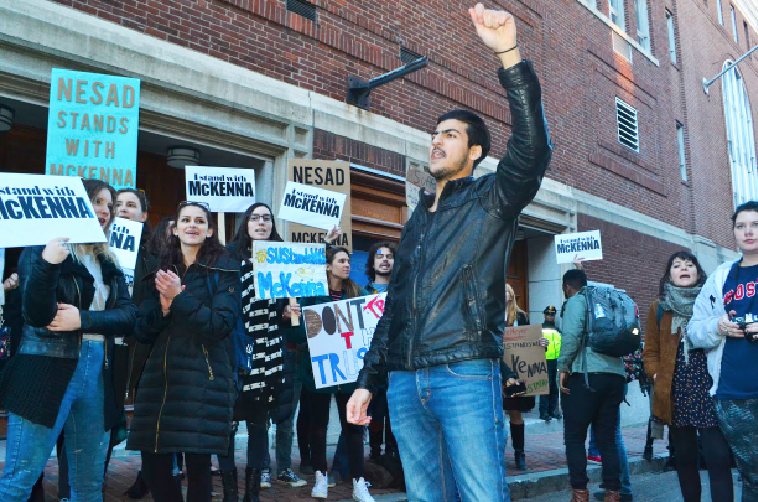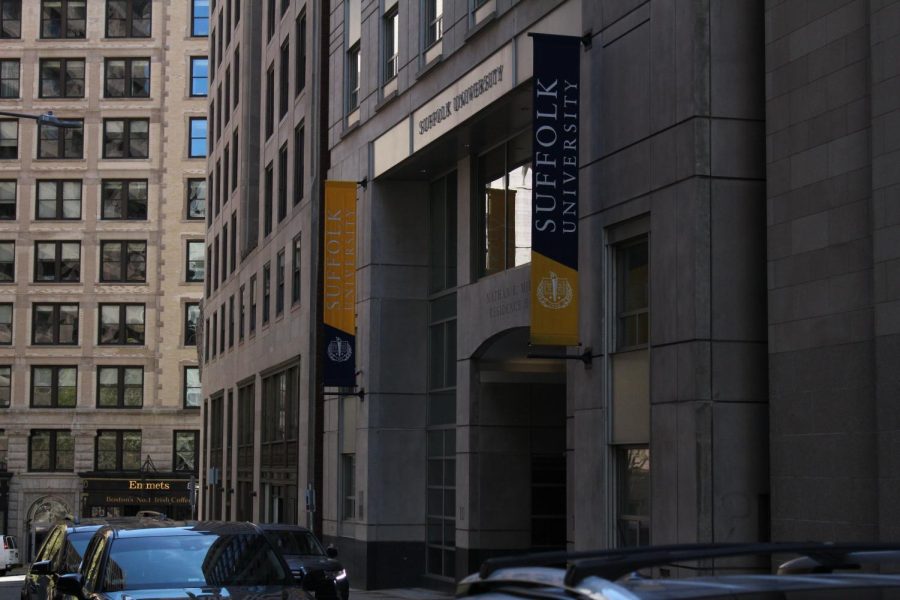In what has become a campus-wide crusade to sequester the threatening termination of the university’s fourth president in five years, Suffolk University students took to the streets in mass meetings outside the standing room only C. Walsh Theatre on Tuesday.
Inside the theater, hundreds of faculty and students joined forces in support of the embattled and sharply criticized President Margaret McKenna, many calling openly for the resignation of members of the Board of Trustees. In response to a five-day media nightmare in which the university’s Board publicized its efforts to remove McKenna from office after seven months, students expressed frustration on the degradation of the university’s reputation and the value of their degrees as a result with handcrafted signs and chants, “Don’t Trust the Trustees,” and “Fire Meyer,” referring to the Chairman of the Board of Trustees, Andrew Meyer, who failed to return several interview requests from the Journal.
“Fundamentally we all want to be part of a university whose name means something,” said Andres Del Castillo, a sophomore political science major.
“All of that is being overshadowed by the steps that our Board is taking that are having a negative effect on the name of our university. It is our right and responsibility to tell them we’re tired.”
On the sidewalk of Suffolk’s former building, Del Castillo cried, “It is on us to lift up the name of our university,” eliciting loud chants, “Whose school? Our school” in response. The cries could be heard by the assembled students and faculty members inside the auditorium, where Student Government Association President Colin Loiselle was amongst speakers addressing an anxious audience.
In an interview with the Journal, Loiselle shared SGA’s plans to move forward with a vote of “no confidence” in Meyer this Thursday. “I think at some point there has to be some sort of accountability. You have a Board of Trustees that’s airing their dirty laundry in the media. They’re tarring the reputation of the university,” said Loiselle.
Rumors of the Board courting former Attorney General Martha Coakley to take over as president broke in the Boston Herald and Boston Globe late last week.
Coakley said in a statement she is not a candidate for the corner office at the university on Tuesday afternoon. “I would like to clarify that I am not a candidate for the role of president of Suffolk University nor will I be,” she said to the Globe, citing her plans to continue her law practices at Foley Hoag.
In an e-mail on Friday, Meyer addressed Suffolk faculty members stating the Board’s need to maintain a strong institution by taking steps to correct university problems, possibly prioritizing the Board’s long-term goals over potential short term wants by the university.
The openly criticized president on her financial decisions and what has been called an “abrasive” manner, received a cease and desist letter from the Board of Trustees on Friday, warning her to refrain from using any “university resources” to campaign for her job, which included the use of university spokesman and Vice President of Marketing and Communications Greg Gatlin as a means to sway trustees or Board members in either direction, according to the Boston Globe.
As turmoil increases and the future of Suffolk remains at large up in the air, faculty, student and alumni have worked tirelessly since last week to hear McKenna’s side of the story, galvanizing intense support through social media with the hashtag #SUStandsWithMcKenna.
The faculty senate’s resolution released Friday supports McKenna’s initial appointment and continuance at Suffolk, stating she has a “long and distinguished career in Higher Education and great success in her previous Presidency,” and has demonstrated a “willingness to make difficult choices to secure the future of Suffolk University.”
In an interview with the Journal, Associate Professor and Chair of the Department of Government Rachel Cobb addressed the state of the university, “I think we need stability, not instability, and I think that’s true for faculty, staff, students and alums.”
“I think students, faculty and staff believe the Board is stepping outside of its proper role,” said long-term Government Professor John Berg, who this week published an editorial in Commonwealth magazine addressing the previous recommendations of reform by the university’s regional accrediting body, New England Association of Schools and Colleges, Inc.
In 2014 in a letter to former President James McCarthy, NEASC outlined problematic behavior exhibited by the Board and its inability to deliver best practices to address its internal governance.
In an interview with the Journal late Tuesday, Chair of the Philosophy Department Greg Fried shared NEASC’s expectations of the university and its need to define a new clarified governance structure where the Board fulfills the traditional role of a board, which is fundraising and general oversight and the president and the administration fulfills its traditional role of operations.
“The problem has been that the Board has been interfering in operations which is not the norm for Higher Education. One of the most significant features of that dysfunction is that the Board has not revised its bylaws,” said Fried, who added he recalls its latest revision was likely in 1995.
Unclear on why the revision has yet occurred over the course of two decades and a revolving door of presidents, Fried said, “when there is a lack of clarity of where power resides, power is allowed to act without accountability.”
In addition, Fried expressed that the Suffolk community should expect a faculty resolution in the next few days and that they have drafted potential revisions already.
In an interview on Friday with the Journal, McKenna spoke about her desire to form a relationship with the Board and shared that when she arrived at Suffolk she acknowledged a strong need for changes within the relationship between the Board of Trustees and the president, “I’ve always wanted a true partnership with the Board,” she said.
What will become of McKenna’s want to form a relationship with the Board will be determined Friday when the two will convene to vote on her removal from office, a meeting in which the Alumni for the Integrity of Suffolk University has expressed worry in a statement released to the Journal on Tuesday.
“We are deeply concerned that the university’s reputation may not withstand another leadership transition and that the Board of Trustees are willing to gamble with the future of the institution,” said the statement.
Advocating for a full review of facts and information before any decision is made, the Alumni for the Integrity of Suffolk University further called on the Board to postpone any vote to remove McKenna from office until all sides are heard by an unbiased audience.
“We believe that a third party can offer objective recommendations that ultimately lead to a reasonable resolution,” said the statement.
In a press release on Monday, SGA stated their concern surrounding potential conflicts of interest between the Board of Trustees and its use of Regan Communications as an institutional consultant in Friday’s deliberation.
Amidst the ongoing media blitz and the university’s suffering public image, Feb. 1 marked the regular admission deadline for Fall 2016 applicants. Accepted students will be notified on March 20 on their admission decision.
Del Castillo rallied students to consider the impact of Friday’s decision on their future as Suffolk students. “For those of you who are freshmen, do you want to deal with five more presidents in the time that you are here? For those of you who are seniors, do you want your diploma, your degree to be signed by a president that just walked in or is about to leave?”
Contributions by Jacob Geanous, Sam Humphrey, Alexa Gagosz and Brigitte Carreiro.




















